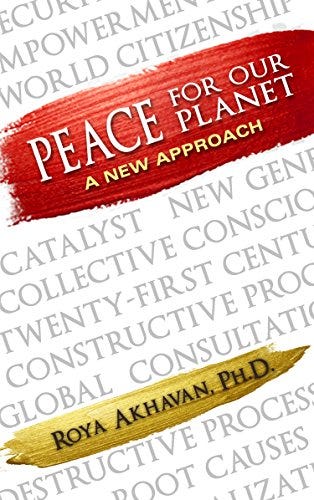Feminine Leadership: A New Paradigm for the 21st Century

by #ebbfmember Roya Akhavan, Ph.D.
This article presents the essence of what I have learned about leadership throughout my career and the insights that have motivated me to launch a new think-thank, The Global Institute for Feminine Leadership, aimed at elevating the feminine aspects of humanity in leadership by men and women to help resolve global challenges.
My interest in leadership began early in my academic career in the 1990’s, when I was given an opportunity to interview a group of university faculty about the qualities that they sought in an ideal department chair. The repeated references by the respondents to such characteristics as “caring and concerned,” “willing to listen and maintain open communication,” and “able to bring out the best in the faculty” struck me as the kind of caring and nurturing traits traditionally associated with the “feminine” aspects of humanity and piqued my interest in further research.
The leadership literature, I found, had already begun to show a visible shift from a task-oriented, top-down management model to a transformational leadership model. As early as in 1991, Fairholm had characterized the emerging model of leadership as embodying a philosophy of “service to the individual in their quest for growth;” one that “asks the leader to be aware of the developmental needs of each worker all the time” in a “process of bonding workers to the leader.” The ideal leader needed to “share and give away power and let others share the function of leadership without becoming insecure.”
The emergence of these new notions in leadership during the last decade of the 20th century coincided with a growing number of studies on effective leadership that showed a clear trajectory away from traditionally male traits toward traditionally female characteristics and emphasized leadership behaviors that women tended to engage in more frequently than men.
As described by Smith and Smits (1994), “The eighties archetype — self-absorbed, competitive, aggressive, and even ruthless — has been reborn for the nineties as the selfless steward. The latter leads by helping subordinates, cooperating with peers, and nurturing a sense of family in the workplace, behaviors that many people believe are more consistent with the early socialization of females in most cultures.” Overall, according to these authors, the new models of effective leadership reflected a shift from “influence through exercise of legitimate power (position) to influence through persuasion (interpersonal networking);” from “competition (play hard) to cooperation (play fair);” from “individualism (by me, for me) to collectivism (team first);” and from “exclusionary (divide and conquer) to inclusionary (power-sharing, sense of family).”
Many studies conducted in the 21st century by both academics and industry practitioners have echoed and built on these concepts. For example, Eagly and Carli (2004) conducted a series of meta-analyses of several dozen leadership studies in which gender was studied as a factor and concluded that: “Modern characterizations of effective leadership have become more consonant with the female gender role.” Later studies by international consulting firms, such as McKinsey & Company (2008), confirmed that “these leadership behaviors — in short supply in today’s corporations — will be critical to meet the expected challenges companies will face over the coming years.”
During the last decade, leadership research has continued to highlight and uphold these concepts. In addition, the performance of women leaders as heads of state during uniquely tumultuous times in recent years has provided clear evidence of the effectiveness of empathy, emotional intelligence, and moral courage in addressing critical global challenges.
In the context of these advances in research during the last few decades, a key question remains to be answered: Why is it that despite the growing evidence of the effectiveness of feminine skill sets in leadership, progress toward such a leadership culture has remained so halting and, instead, aggressiveness, top-down imposition of power, and ruthless competition continue to characterize the leadership traits most visible across our planet? Clearly, embracing an empathetic approach to leadership is not the domain of any one gender. Both men and women are equally capable of it. Indeed, these traits belong to the realm of the spirit of each individual, not their physical gender identity.
The primary thesis of The Global Institute for Feminine Leadership is that, to facilitate a paradigm shift in leadership that elevates and harnesses the feminine aspects of humanity, we must first reckon with the systemically ingrained and psychologically internalized patriarchal values that have glorified power over service and control over empathy throughout millennia.
Gendered values continue to be instilled in a multi-pronged process of socialization since early childhood across the globe. Within the dominant patriarchal framework, power is glorified over service, considered superior to all else, and closely identified with the masculine domain. On the other hand, nurturing and service roles, implicitly considered to be inferior, are relegated to the feminine domain.
As already stated, people of all genders have the human capacity to enact what research has shown to be the most effective behaviors in leadership. Yet, asking men to embrace an empathetic and emotionally intelligent approach to leadership in the face of a lifelong socialization that has labeled and devalued these behaviors as signs of “weakness” rather than “strength,” remains difficult.
The dominant patriarchal culture continues to reward behaviors associated with the masculine aspects of humanity and reflexively devalue exactly those leadership behaviors that promise to enable us to effectively address dire global challenges. As such, despite women’s socialized orientation toward decidedly valuable leadership traits, the prevailing culture often demands that they too suppress these traits in favor of being “tough” and “aggressive,” if they wish to be considered for leadership positions.
Another persistent problem is that, when highly competent women leaders succeed in incorporating these crucial skills in their leadership, they tend to receive strong push-back from their corporate, organizational, or political environment. This situation has been well-stated by Jacinda Ardern, the celebrated former Prime Minister of New Zealand:
“One of the criticisms I’ve faced over the years is that I’m not aggressive enough or assertive enough, or maybe somehow, because I’m empathetic, it means I’m weak. I totally rebel against that. I refuse to believe that you cannot be both compassionate and strong.”
Yet, a gradual shift is underway. Many among the younger generation of leaders are providing us with clear evidence that the collective global consciousness is increasingly open to a fundamental rethinking of the current notions of “weakness” and “strength.” Among the evidences of this trend are the recent discourses initiated by young thought leaders on what it means to be a “real man,” and the growing body of research in the field that continues to implicate the dominant notions of “strength” as the root causes of many of our seemingly intractable global challenges, including violence and war.
As stated by Abdul-Baha over a century ago, “The world in the past has been ruled by force. . . But the balance is already shifting; force is losing its dominance, and mental alertness, intuition, and the spiritual qualities of love and service, in which woman is strong, are gaining ascendancy. Hence the new age will be an age, less masculine and more permeated with the feminine ideals.”
This statement upholds the “spiritual qualities of love and service” as key aspects of the feminine ideals in the emerging global paradigm. The Global Institute for Feminine Leadership aims to engage with this shift by going beyond expanding the number of women in leadership positions to effect a complete transformation in how leadership is defined and enacted by all leaders. A true paradigm shift in leadership can only be achieved when we recognize love and service as fundamental spiritual qualities to be pursued by all human beings, regardless of their gender.
The Institute will begin its work by taking action in the following areas:
Research and publication
Research on what we have termed “feminine leadership” and its crucial role in resolving global challenges requires cutting-edge scholarly and applied engagement. The Institute will function as a primary think tank for research on leadership best practices, with a focus on the impact of gender roles on leadership behaviors and their implications for humanity’s ability to effectively resolve critical global challenges.
Education and training in corporate and organizational settings
In addition to publication and dissemination of research results, the Institute aims to engage with all relevant organizations as a provider of leadership education and training. A key goal of the Institute will be to pursue innovative approaches to leadership training that can inspire heartfelt self-reflection and sustainable behavior change.
Conferences, webinars, and podcasts
As a means of raising the collective consciousness on the key role that feminine leadership can play in resolving global challenges, the Institute will provide opportunities to all interested parties to engage in constructive conversations through interactive conferences, webinars, and podcasts.
Community forums
This Global Institute belongs to the local communities of likeminded people who are seeking a channel to initiate their own activities in raising the collective consciousness about the need for a paradigm shift in leadership. As such, the Institute will provide the opportunity to interested individuals to start their own chapters of the Institute anywhere across the planet.
Youth groups
We believe that early socialization in balanced leadership practices that uphold the crucial strengths of the feminine aspect of humanity is fundamental to building a better future. Engagement of the youth in all our endeavors across the globe constitutes a key aim of the Institute.

You can find out more about Roya Akhavan PhD at https://www.linkedin.com/in/roya-akhavan-67139a4b/
Her work at her foundation here:
www.globalfeminineleadership.org
You can also find her most recent book in ebbf’s “books we recommend” section here: https://www.ebbf.org/books-by-members

